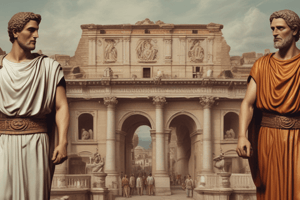Podcast
Questions and Answers
Who among the following emperors is NOT considered part of the 5 Good Emperors Dynasty?
Who among the following emperors is NOT considered part of the 5 Good Emperors Dynasty?
- Hadrian
- Antoninus Pius
- Caligula (correct)
- Nerva
Which emperor is known for his juvenile, incompetent, and decadent rule that contributed to Rome's decline?
Which emperor is known for his juvenile, incompetent, and decadent rule that contributed to Rome's decline?
- Commodus (correct)
- Trajan
- Vespasian
- Claudius
In which dynasty did the Roman Empire experience high taxes and limited power for the Senate?
In which dynasty did the Roman Empire experience high taxes and limited power for the Senate?
- 5 Good Emperors Dynasty
- Ptolemaic Dynasty
- Julio-Claudian Dynasty
- Flavian Dynasty (correct)
Who started a rumor that Mark Antony and Cleopatra were planning to take control of Rome from Egypt?
Who started a rumor that Mark Antony and Cleopatra were planning to take control of Rome from Egypt?
Which emperor adopted a wealthy son due to not having any surviving heirs?
Which emperor adopted a wealthy son due to not having any surviving heirs?
When did Rome split into two parts according to the text?
When did Rome split into two parts according to the text?
Flashcards are hidden until you start studying
Study Notes
Roman Empire Rulers
- Octavian (Augustus) Caesar's nephew becomes Emperor of Rome and institutes Triumvirate (3 men ruling collectively) with Mark Antony and Lepidus.
Triumvirate Period
- Mark Antony stations himself in Egypt with Cleopatra.
- Lepidus starts a rumor that Mark Antony and Cleopatra are planning to take control of Rome from Egypt.
- Augustus reminds Emperor and Rome thrives economically and culturally during his reign.
Julio-Claudian Dynasty
- Augustus (27 BCE-14 AD) adopts Tiberius as his son due to lack of surviving heirs.
- Tiberius (14-37 AD) takes over as Emperor and starts a dynasty of cruel tyrants who use murder as a control factor, humiliate and manipulate the senate, and use imperial money for personal gain.
- Caligula (37-41 AD) rules next, followed by Claudius (41-54 AD) and Nero (54-68 AD), who is eventually struck from Roman official records.
Flavian Dynasty
- Vespasian (69-79 AD) becomes the first Emperor of the Flavian Dynasty and institutes military, senate, and tax reforms.
- The final Emperor of this dynasty rules tyrannically, imposes high taxes, and limits the senate's power, eventually getting struck from Roman official records.
5 Good Emperors Dynasty
- Nerva (96-98 AD) starts the 5 Good Emperors Dynasty, followed by Trajan (98-117 AD), Hadrian (117-138 AD), Antoninus Pius (138-161 AD), and Marcus Aurelius (161-180 AD).
- During this period, the empire expands, leadership is consolidated, and the economy thrives.
Decline of the Roman Empire
- Commodus (180-192 AD), the son of Marcus Aurelius, rules incompetently and decadently, leading to the decline of the Roman Empire.
- Repeated attempts are made to reform the empire, but by the late 300's, Rome is divided into two separate entities.
Studying That Suits You
Use AI to generate personalized quizzes and flashcards to suit your learning preferences.



